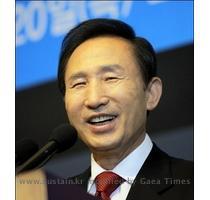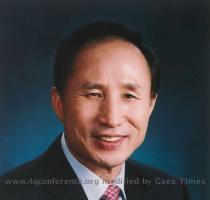South Korean president sees no possibility of war with North over ship sinking
By Vijay Joshi, APSaturday, June 5, 2010
SKorea’s Lee sees no possibility of war with North
SINGAPORE — South Korea’s leader on Saturday ruled out going to war with North Korea, hours after his government asked the United Nations to punish the communist nation over the sinking of a warship.
“There is absolutely no possibility of a full-scale war on the Korean peninsula,” President Lee Myung-bak told a group of businesspeople in Singapore. The meeting was closed to the media, and the comments were posted by Lee’s spokesman, Park Sun-kyu, on the presidential website.
“But occasionally, there has been locally peace-threatening behavior” from North Korea, Lee said, adding that “we will strongly suppress it.” He did not elaborate.
It was the first time since the ship sinking that Lee has categorically ruled out war with North Korea. The North, however, has warned that any move to punish it over the sinking could led to war.
Lee’s comments were aimed at assuaging prospective investors. “Don’t worry about a war, invest,” he was quoted as telling the businesspeople. The two Koreas technically remain in a state of war because their three-year conflict ended in a truce, not a peace treaty, in 1953.
North Korea denies it is responsible for the March sinking of the South Korean corvette Cheonan which killed 46 sailors. An international probe concluded that a North Korean submarine torpedoed it.
On Friday, South Korea officially referred North Korea to the U.N. Security Council, taking its strongest step ever toward making the communist North face international punishment.
It set the stage for the possibility of the most intense confrontation between North Korea and the U.N. Security Council since the 1950-1953 Korean War, which was authorized by the council in response to an invasion of South Korea by North Korean forces. Closed-door council consultations on the Cheonan incident were scheduled for Monday morning, according to the U.N. spokesman’s office.
Lee, who is in Singapore to attend a security summit organized by the London-based International Institute for Strategic Studies, on Friday urged North Korea to “admit its wrongdoing” and pledge to “never engage in such a reprehensible action.”
“If the enemy continues to taunt us and think that they can do whatever they want they must understand that there is a limit,” Lee said. They “must understand very clearly that they will have to suffer the consequences.”
He told the businesspeople on Saturday that it is important that North Korea “quickly opens and follows the path of industrialization like China.”
He said South Korea has laid out a comprehensive solution that would guarantee the survival of the North Korean government and provide economic aid in return for the North’s abandoning its nuclear weapons program.
Despite a history of being attacked by North Korea, Seoul had never taken the North to the Security Council for an inter-Korean provocation before.
The Security Council has several choices: a resolution with or without new sanctions against North Korea, a weaker presidential statement calling for specific actions, or a press statement.
U.N. diplomats familiar with consultations on possible action against North Korea said China, the North’s closest ally, is opposed to new sanctions and indicated the more likely result will be a presidential statement. The diplomats spoke on condition of anonymity because the contacts have been private.
The Security Council previously imposed sanctions against North Korea after its two nuclear tests in 2006 and 2009. These include U.N. embargoes on nuclear and ballistic missile-related items and technology, on arms exports and imports except light weapons, and on luxury goods.
U.S. Defense Secretary Robert Gates, who addressed the security summit on Saturday, said North Korea must be made to face the consequences of its action.
“For nothing to happen would be a very bad precedent,” he said without elaborating. “This sinking is far more than a single, isolated incident.”
Associated Press writers Kwang-tae Kim in Seoul, Edith M. Lederer and John Heilprin at the United Nations and Anne Gearan and Alex Kennedy in Singapore contributed to this report.
Tags: Asia, East Asia, Foreign Policy, International Trade, Lee Myung-bak, North Korea, Seoul, Singapore, South Korea, Southeast Asia, Summits

